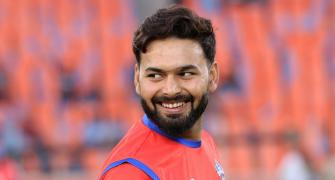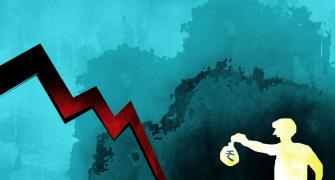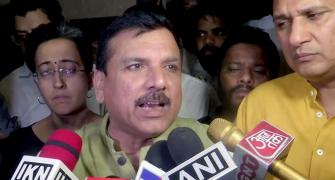Indians often accuse their politicians of being short-sighted. Judging by the campaigning for the Bihar assembly elections the principal parties are actually looking at least as far into the future as the Lok Sabha polls of 2014.
If you ask me the most interesting part of this election is the shadow-boxing within the National Democratic Alliance.
The Bharatiya Janata Party's Narendra Modi and the Janata Dal-United's Nitish Kumar are vying for leadership of the alliance -- not for today but definitely for tomorrow.
It is a bit silly to accuse -- as Rahul Gandhi has done -- Nitish Kumar of being 'opportunistic' about the alliance with the BJP. To set the record straight, that friendship dates as far back as 1995, when P V Narasimha Rao was the prime minister and Lalu Yadav was the chief minister of Bihar.
Nitish Kumar and George Fernandes then led the Samata Party, which has since evolved into the Janata Dal-United.
Nitish Kumar stayed loyal to the alliance despite losing the state polls of 1995 and 2000, as well as the near miss in the first set of assembly elections in 2005. (A hasty call to the President, then in Moscow, led to President's Rule in Bihar, giving Nitish Kumar no chance to prove his strength in the newly-elected assembly.)
That loyalty -- or political necessity -- was also strong enough to withstand the disappointments of the Lok Sabha elections of 1996, of 2004, and of 2009. Whatever other adjective you may use of Nitish Kumar he has proved anything but 'opportunistic'.
Given this 15-year history why are Modi and Nitish Kumar now eyeing each other so warily?
The simple answer is that they both believe that the NDA shall be a real contender for power come the Lok Sabha polls of 2014. They also believe that, in the absence of a towering figure such as L K Advani, the leadership of the alliance may be up for grabs.
Finally, they also know that they are -- again Advani apart -- probably the two most visible faces of the alliance.
In the ordinary course of events Modi would probably be the clear front-runner. He is by far the best chief minister in India, has propelled his state ahead of the rest when it comes to development, and has won every electoral challenge thrown at him -- Lok Sabha polls, assembly polls, or local body polls.
But how far does Modi's appeal extend beyond Gujarat?
Neither the Congress nor the 'secular' media have lost -- shall never lose -- any opportunity to hang the 'communal' tag around Modi's neck. Whether it is the Bihar elections today, the Gujarat elections due in 2012, or the Lok Sabha polls of 2014, we may be sure that the chief minister of Gujarat shall be painted as anti-Muslim.
If successful, this will put a severe dent in Modi's acceptability, particularly in those pockets of the Hindi belt where Muslims constitute a major chunk of the electorate.
It is to counter this perception that Modi said, after the Gujarat local body elections a few weeks ago, that even a third of the Muslims had voted for him.
To lead the NDA successfully come 2014 Modi must prove he has convinced Muslims not to vote against his party.
The first people he must convince are his fellow NDA leaders. What happens should he be unsuccessful in this task?
In such a case it is entirely possible that Nitish Kumar may be the most acceptable face of the NDA even if he is not the leader of the largest party in the alliance.
There are, to be sure, qualified leaders in the BJP itself, like Shivraj Singh Chauhan, the chief minister of Madhya Pradesh, who passed the test by leading his party to a second consecutive term in power. But Nitish Kumar possesses the priceless asset of fame.
If Nitish Kumar can lead the alliance back to power in Bihar in the ongoing elections he is well-placed to argue that he is the best placed to win over the Hindi belt. And it is hard to see either the UPA or the NDA forming a truly stable government in Delhi without those seats.
(Lalu Yadav was almost certainly correct when he burst out that the Congress wants to destroy regional forces such as his own Rashtriya Janata Dal and Mulayam Singh Yadav's Samajwadi Party; Rahul Gandhi can never have his coveted stable majority without winning back the voters who left the Congress stable starting in 1989.)
But, rightly or wrongly, Nitish Kumar feels that his victory in Bihar would have a question mark over it if Modi were involved in the campaign. If the Gujarat chief minister's presence did not alienate Muslim voters -- thus potentially losing Nitish Kumar the election -- it would buttress Modi -- by proving that Muslim voters were not allergic to him.
That, one suspects, is why the chief minister of Bihar struggled to keep his BJP counterpart out of the state.
Advani, of course, knows the game as well as anyone else. Why else would he make it a point to praise Modi while campaigning in Bihar, pointing out that, in terms of per capita income, Muslims were better off in Gujarat than anywhere else in India?
Without saying it outright, the senior leader was telling Muslims that they could -- and should -- have no exaggerated fear of Modi.
Running parallel to all this is, of course, the increasingly public squabble between the Congress (represented by Rahul Gandhi) and the regional forces in the UPA (championed by Lalu Yadav).
But that, for now, must remain a story for another day -- not least because the Congress is not much of a force in Bihar judging by the last Lok Sabha polls. (It won just two of Bihar's 40 seats and polled only 10.26 percent of the votes cast.)
I do hope, however, that leaders on all sides know the dangers of counting one's eggs before they are laid.
Looking to 2014 is all well and good but there is the small business of winning in 2010 that looms ahead just now.





